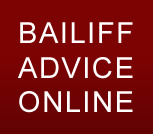Chargeback request for bailiff fees
If you have made a payment to a bailiff/enforcement agent and are considering making a chargeback request for bailiff fees to your bank or credit card provider, then please read this page first. From the many inquiries that we receive on this subject, debtors are encouraged to consider a ‘chargeback’ following misleading and highly inaccurate information on a small number of internet sites.
What is a Chargeback?
A Chargeback is a request to your bank or credit card provider to reverse a transaction if there is a problem with something you’ve purchased on your credit or debit card. For example: if goods have not arrived, are damaged, are different from the description, or where the merchant has ceased trading.
Why are ‘chargeback’ requests recommended?
In relation to bailiff enforcement, ‘chargeback’ requests appear to be for the purpose of reclaiming ‘disputed’ bailiff fees.
What ‘advice’ is being given to somebody who has paid a bailiff?
As an example, one particular website encourages debtors to Pay and Reclaim and alarmingly, advise that when completing a ‘chargeback’ application form, that they should not reveal to the card provider that the payment had been made to a bailiff company and instead; should claim that ‘undue pressure’ had been made upon them to obtain a ‘money transfer’. Worse still, the website advises debtors that the chances of getting a ‘rapid chargeback’ to a ‘near certainty’ will be strengthened if they enclose a sworn statement of truth to allege that the transaction had been made ‘under duress’.
If a chargeback request for bailiff fees is made…..what happens to the warrant?
In the very unlikely event that the bank or credit card provider reverses/refunds the transaction, the enforcement company will treat the reversal in exactly the same way as if payment had been made by cheque and the cheque had bounced (been declined by the bank). The warrant of control will not have been satisfied and accordingly; would not ‘cease’ to have effect. The debt (and bailiff fees) would still be owing and the bailiff would be legally entitled to recommence enforcing the warrant. Most importantly, when this happens, it is always the case that a bailiff will refuse to accept a payment proposal and instead, will insist that the entire amount (including bailiff fees) be paid in cash. A request to make further payment by debit or credit card will be refused.
Chargeback request for bailiff fees when a car has been removed to the pound.
If your car has been removed to the car pound and you are considering collecting the car and then making a chargeback request for bailiff fees, you need to be aware that almost all vehicle pounds insist that vehicles will only be released from the pound if payment is made by cash.
Making a false allegation on a credit card chargeback form.
Debtors lying on credit card chargeback application forms are unwittingly committing fraud themselves and could be prosecuted.
Note from Bailiff Advice Online
The fees that a bailiff can charge are clearly provided in legislation and full details can be read here. If you consider that you have been overcharged then it is vitally important that you contact the enforcement company for an explanation of the charges.
